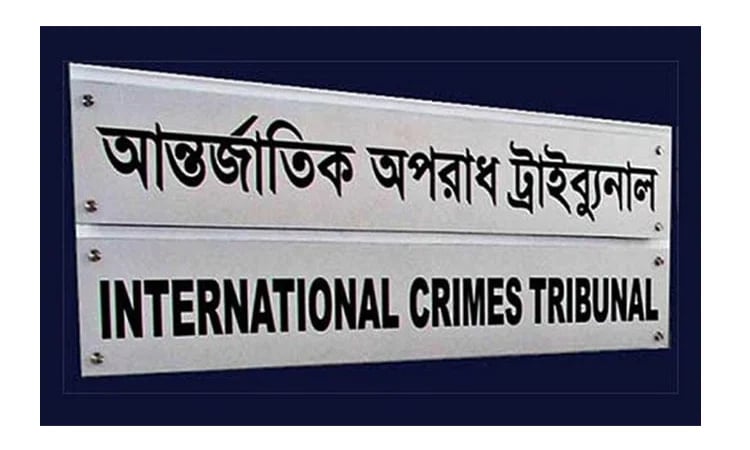News Flash
News Flash

By Didarul Alam
DHAKA, Aug 10, 2025 (BSS) - The International Crimes Tribunal (ICT) has confirmed that 84 individuals, out of 209 accused in 30 miscellaneous cases of crimes against humanity related to the July Uprising, are now in custody.
The prosecutor of the ICT, Gazi MH Tamim, told BSS, saying that the tribunal has, so far, received approximately 450 complaints related to these cases.
"Out of the 30 miscellaneous cases, charges have been submitted in five and formal charges have been framed in three of them," he said.
Among those currently imprisoned in connection with the crimes committed during the July Uprising are renowned figures like former ministers from the ousted Awami League government, including Anisul Haq, Amir Hossain Amu, Md. Abdur Razzaque, Qamrul Islam, Muhammad Faruk Khan, Dr. Dipu Moni and Golam Dastagir Gazi.
Other prominent figures in custody included former advisers to ousted Prime Minister Sheikh Hasina, Salman F. Rahman and Toufiq-e-Elahi Chowdhury, former minister and Workers' Party president Rashed Khan Menon and former minister and Jatiya Samajtantrik Dal president Hasanul Haque Inu.
Besides, former state ministers Kamal Ahmed Majumder and Junaid Ahmed Palak, former lawmaker Solaiman Mohammad Selim, former secretary Md. Jahangir Alam and retired Justice AHM Shamsuddin Chowdhury Manik and former Director General of the National Telecommunication Monitoring Center (NTMC) Major General (dismissed) Ziaul Ahsan are also facing charges.
The ICT has already begun hearing testimonies in a case involving crimes against humanity allegedly committed by the ousted prime minister Sheikh Hasina, former home minister Asaduzzaman Khan Kamal and former Inspector General of Police (IGP) Chowdhury Abdullah Al Mamun as accused. While Abdullah Al Mamun has been arrested, Hasina and Kamal remained at large.
The record of testimony in a case of crimes against humanity against Sheikh Hasina has already begun at the tribunal. Ousted prime minister Sheikh Hasina, former home minister Asaduzzaman Khan Kamal and former IGP Mamun are accused in this case.
Three other cases are being considered, including the shooting death of Begum Rokeya University student Abu Sayeed in Rangpur, the killing of six protesters in Dhaka's Chankharpool and the burning of six bodies in Ashulia.
Besides, a complaint has been filed regarding the death of a student found hanging in the capital's Rampura area.
In relation to the case involving Sheikh Hasina and the others, testimony continues with the next session scheduled for August 17. Five witnesses have already given their statements to the ICT-1.
The ICT-1 has also formally charged eight accused, including former Dhaka Metropolitan Police (DMP) Commissioner Habibur Rahman, in the case concerning the shooting deaths of six people during the Chankharpool protests. The opening statement for this case will take place on August 10, followed by testimony on August 11.
The opening statement and first testimony will be taken in the case of crimes against humanity in the killing of Abu Sayeed, a student of Begum Rokeya University in Rangpur, during the anti-discrimination student movement on August 27 next.
Simultaneously, hearings have begun in the case involving the killing and burning of protesters in Ashulia. The ICT has also focused on the reformation of its structure, following the fall of the Awami League government during the mass uprising of August 5, 2024. The tribunal was reconstituted shortly thereafter to address the complexity of these cases.
The first "miscellaneous case" was filed against Sheikh Hasina in the restructured tribunal. Two additional cases have been filed against her: one related to enforced disappearances and murders during her tenure and another linked to the deadly Hefazat-e-Islam rally at Shapla Square in 2013. Trials are ongoing in both cases.
Chief Prosecutor Mohammad Tajul Islam told BSS that the challenges involved in prosecuting such high-profile cases. "The prosecution must balance the expectations of justice seekers, the law, international standards, the rights of the accused and proper investigation procedures," he noted.
"We are determined to ensure that no one can question the fairness of this trial. For the first time, the proceedings are being broadcast live on television."
Islam stressed the scale of the crimes, stating, "This is not an ordinary murder case. We are dealing with the deaths of 1,500 individuals -- many of whom did not receive post-mortem reports. The investigation is complex but undeniable evidence has surfaced and international media have exposed the crimes".
The International Crimes (Tribunal) Act-1973 has been amended through two separate ordinances in February and May 2025 to ensure the tribunal meets modern international standards. The tribunal itself was restructured in October 2024 and in May 2025 as the government created a second tribunal to expedite the proceedings.
Chief Prosecutor Islam also mentioned that the renovation of the tribunal's building has been completed in collaboration with the Ministry of Housing and Public Works.
Ex-IGP made 'state approver' in case against Sheikh Hasina
After the formal charge sheet was filed against Sheikh Hasina in a case of crimes against humanity committed during the July uprising, testimony has begun.
Ex-IGP Mamun, one of the accused in the case, has admitted his involvement in crimes against humanity and has given a statement to the tribunal.
Along with this, he also applied to the tribunal as an 'approver' (an accused who admits guilt and reveals the true account of the incident; he is generally known as a royal witness) on July 10.
After the former IGP's statement, the tribunal ordered the formal charge sheet to be filed. At the same time, the tribunal granted the application that former IGP Mamun had made as an 'approver'.